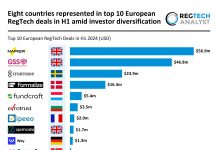For those in the business of fighting financial crime, 2022 was a hectic and challenging year, with the war in Ukraine and new challenging KYC trends being key threats.
In a recent whitepaper by Encompass, the company reflected on some of the ‘mega-trends’ of the last year and how they have created an ever more urgent need for KYC automation and transformation in 2023.
One of the significant trends in 2022, Encompass claimed, was the growing importance of effective KYC within regulated firms. In addition, KYC itself is evolving.
“Increased technological adoption and the focus on efficient and adaptive processes is itself a focus point in regulatory compliance, meaning that process automation and thus perpetual KYC (pKYC) are converging with reality.
With this, trajectory, clarity and consensus are emerging among compliance professionals on what pKYC is (and is not) and what the roadmap to achieving it might look like as firms move forward,” said the firm.
Any discussion surrounding 2022 wouldn’t be complete without the topic of the Russia-Ukraine war. The war, which has seen the topic of sanctions raised to the top of the agenda for many months, highlighted the complex and volatile world that sanctions can create.
According to Encompass, these dynamic sanctions lists bring a number of potential clients into focus for regulated firms. Sanctions – which vary across major economies and jurisdictions – can make it extremely tough for financial services companies to ensure compliance.
The company remarked, “These external forces can be exacerbated by internal factors when regulated firms are not set up to succeed. Outdated name screening technology, for instance, exposes firms to greater risks of non-compliance. Entity resolution, using advanced technologies such as fuzzy matching, is quickly being adopted to link customer data even on inexact matches that would have previously been missed.”
How can KYC transformation play a part in this? Encompass explained that KYC transformation involves moving from a traditional, manual approach to onboarding new customers and reviewing existing customers and identifying suspicious parties.
“KYC transformation can also be applied to ongoing customer reviews once onboarded, with the goal of categorizing risky or sanctioned customers, especially with the increasing frequency of sanctions regulations across multiple jurisdictions,” it added.
Conventional customer risk review processes can often be manual and rely on disparate internal and external datasets, which can often lead to inefficient, costly and outdated risk assessments. This, Encompass said, can expose banks to unnecessary regulatory risks, driven by the increasing frequency of sanctions updates.
The company quipped, “Acknowledging that a KYC exercise is only as good as the data it uses, firms must prioritize data quality as a fundamental building block in their modernized process.
“Complete, high-quality data can enable technology integration approaches, including APIs that integrate disparate workflow solutions and data sources to create a single customer view from potentially many instances of their data across the organization. APIs also help to standardize KYC processes, leading to reliable and auditable outcomes that audit teams can approve.”
A key way for companies to stand out in this area is to identify the best-of-breed external data sources. In this, such firms stand to gain not only the knowledge of the external data itself, but insights that arise from comparing and linking these data to internal sources. Solutions that serve a useful purpose here, Encompass highlights, are standardised data dictionaries, which allow disparate data sources to be mapped effectively.
Regulatory pressures
With financial crime cases ballooning in recent years, the stimulus for regulators to act has grown massively.
Encompass underlined that during 2022, regulators acted not only with new regulatory measures but also with a greater perceived enforcement threat of new and existing punishments.
A key area of focus in 2022 was around ultimate beneficial ownership (UBO), which Encompass highlighted was easy to anticipate in light of the abuse of shell companies.
The firm added, “Due to the importance and impact of transparency in the fight against financial crime, UBO has become a standout theme of regulatory developments and firms will be forced to update and adapt their KYC processes in response.”
In light of these regulatory upheavals, Encompass believes that KYC approaches need to be robust and risk-based.
“Taking a risk-based approach means that firms identify, assess, measure and ultimately understand the risk that they are being used in money laundering and terrorist financing schemes,” explained the firm.
Considering the complexity of financial crime, technology appears to be one of – if not the main – solution to this complexity. With this, KYC processes need to be adapted to take advantage of automation.
Despite the core regulatory requirements for KYC remaining mostly unchanged, the ability for companies to show they have a robust KYC framework that has efficient and effective controls is vital to stand up to regulatory scrutiny.
“Automation provides the ability to codify the processes in order to demonstrate this robustness, given the KYC processes have been reviewed as part of the transformation journey resulting in consistency of outcomes every time the process is executed,” said Encompass.
Shell companies and UBOs
As highlighted previously, UBOs and shell companies have emerged as key financial crime threats over the past year.
Shell companies refer to corporations whose existence is little more than their official registration. These companies may be associated with bank accounts, and may be the registered owners of assets, but are not actually engaging in revenue-generating business activities.
Key examples of such things include the details found in The Pandora, Paradise and Panama Papers released in 2021, 2017 and 2016 respectively, which ‘continued to paint a bleak picture on the effectiveness of tracing the source of funds’, according to Encompass.
“These releases have helped to highlight the challenge of money laundering and financial crime, with a concerted global effort needed to help build a clearer picture of corporate structures and improve firm defenses against financial crime.
“Regulators, in particular, must take a coordinated approach in order to combat increasingly sophisticated and coordinated global money laundering networks – and transparency will be a key focal point in any successful regulatory regime,” the company explained.
The rise of pKYC
While KYC has long been a practice in the financial crime industry, the recent rise of perpetual KYC is starting to take hold in the industry.
Traditional KYC processes can often be long and burdensome, leading to lengthy customer onboarding. These highly manual process can pose a significant strain on resources and leave customer information updates to manual review and refresh processes.
With financial crime sophistication rising, the increased regulatory compliance burden is expected to increase further – with the cost and effort of compliance increasing for firms who are unwilling to embrace new technologies.
“The increasing availability of digital solutions to support effective KYC/AML has created a unique opportunity for firms to transition to a new, dynamic approach to managing their customer data. Perpetual KYC (pKYC) is based on the dynamic refresh of customer data in response to key trigger events. It is characterized by an adaptive approach and drives a step change from traditional, reactive approaches to KYC information monitoring,” explained Encompass.
Given the impact of global events, pKYC’s dynamic risk profiling of customers can guarantee a real-time view of the customer risk exposure across a company and ensures the potential of out-of-date customer files resulting in business actions with a sanctioned individual will be avoided.
“For monitoring and analysis to be continuous, automation technology is a minimum requirement of the firm’s systems. Beyond that minimum requirement is the huge analytical advantage of also investing in advanced algorithms incorporating artificial intelligence and machine learning – these techniques are known to produce predictive uplifts when trained appropriately on large amounts of unbiased data,” said Encompass.
What to expect in 2023
What can we expect for 2023? According to Encompass, with global sanctions regimes and money laundering scandals triggering strong regulatory responses, we can expect that regulators will continue to act to clamp down on financial crime with KYC as a ‘core mitigating component’, said Encompass.
The European Commission has already conducted a broad assessment of the key AML and terrorist funding risks and is also poised to introduce a package of legislation to address these risks at a global level.
Encompass continued, “We are also seeing a shift to protecting individual privacy, with recent EU court rulings striking down public access to UBO registries. The discussion between privacy and transparency will be ongoing in 2023 given the introduction of 6AMLD from the EU calling for the set up and increased used of beneficial ownership registries to combat financial crime.”
In the US, the passage of the Corporate Transparency Act calls for FinCEN to create a federal-level beneficial ownership registry to boost detection of money laundering to fight financial crime.
Encompass concluded, “Firms will be increasingly conscious that investment in their underlying technology infrastructure is critical to maintaining pace with the volume of regulatory change and the complex and uncertain world we are living in.
“A targeted, time, cost and energy-efficient KYC process – pKYC – is only possible with live data and automation technology, and will only thrive with intelligent algorithms on top of that. So, technology will continue as the prevailing solution to challenges in financial crime compliance.”
Read the full whitepaper here.
In March last year, Encompass raised £25m in a funding round. The round was led by Australian investor Perennial Partners and saw investment from Serendpity Capital, Seven Seat Capital and Microequities Asset Management.
Copyright © 2018 RegTech Analyst






